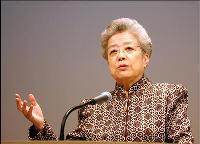George W. Bush meets with a senior Chinese economic minister
President George W. Bush met with a senior Chinese economic minister, a day after high-level economic talks between the countries yielded few results.

At the meeting, Bush gave Vice Premier Wu Yi a kiss on the cheek; she smiled broadly as they posed for pictures, holding on to Bush's arm.
Wu also planned meetings Thursday with frustrated congressional leaders, many of whom are considering legislation that would punish Beijing for trade practices they say have driven U.S. trade deficits to record levels and cost thousands of manufacturing jobs.
Discussions Wednesday between senior Bush administration officials and Wu's delegation failed to reach a breakthrough in the countries' biggest dispute: China's undervalued currency.
After additional meetings Wednesday between lawmakers and Wu, Ways and Means Committee Chairman Rep. Charles Rangel said the Chinese told lawmakers they needed more time to overhaul their currency system and make other changes.
Rangel, a Democrat, told reporters that his committee planned to move forward with legislation; some of the bills being considered would impose stiff penalties on Chinese imports.
Democratic Sen. Charles Schumer, a leading critic of China, described the frustration he said his colleagues felt. "There's never any action," he said in an interview. "I don't think a press release is going to assuage Congress' worries. We need results."
Despite the criticism, both Wu and Treasury Secretary Henry Paulson, head of the U.S. delegation at the talks, sounded positive about the importance of the new high-level "strategic economic dialogue" between the countries, which occur twice a year.
The delegations agreed to more than double the number of daily passenger flights between the two nations by 2012, going from 10 to 23. Cargo flights also were increased. The gains fell short of the openings the Bush administration had hoped to achieve.
In the area of financial services, China agreed to a slight expansion in business opportunities for U.S. companies but not the lifting of caps on foreign ownership of banks, securities firms and insurance companies that U.S. firms had sought.
China rejected U.S. requests that it accelerate the revaluing of its currency, the yuan, which American manufacturers contend is undervalued by as much as 40 percent. That makes Chinese products cheaper for Americans and U.S. goods more expensive in China.
For her part, Wu called the talks "a complete success" and said it was important to continue direct consultations between the two nations rather than resorting to "threat and sanctions."
U.S. business groups had a decidedly more downbeat response.
"It's clear that this dialogue has been nothing but a cynical Bush administration exercise in spin and public relations," said Kevin Kearns, president of the U.S. Business and Industry Council, which represents small and medium-size manufacturing companies. "The failure of the White House's approach is now clear, so the ball is clearly in Congress' court."
Subscribe to Pravda.Ru Telegram channel, Facebook, RSS!


